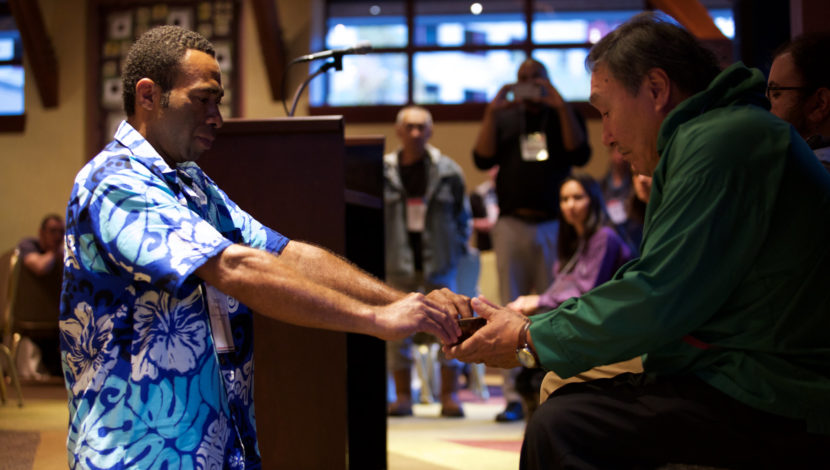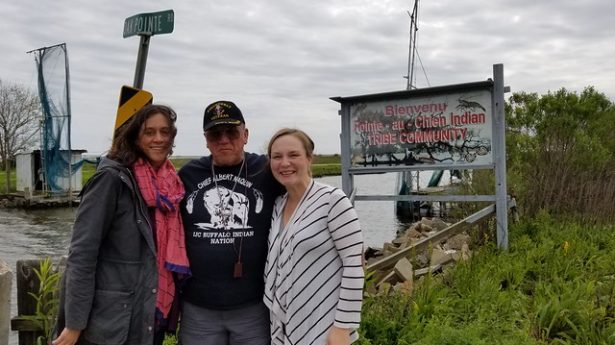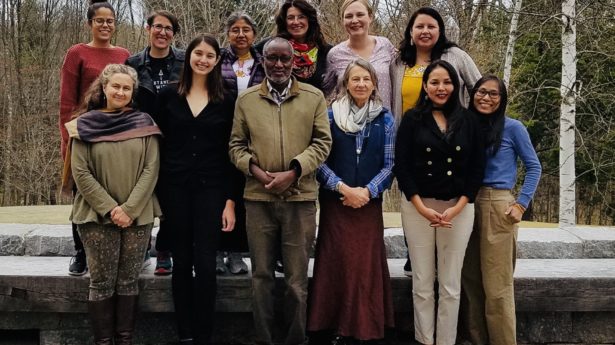The Unitarian Universalist Service Committee advances human rights through grassroots collaborations.
Enduring Relationships: Accountability to Indigenous Peoples

By Rachel Gore Freed on August 8, 2019
In a global appeal to mark August 9 as the International Day of the World’s Indigenous Peoples, U.N.-appointed experts have identified “nation-building” as largely responsible for “ongoing discrimination” and eradication of Indigenous languages and culture.
As part of UUSC’s emerging climate justice work, we’ve prioritized learning about and centering the experiences, struggles, and wisdom of First and Indigenous Peoples and their communities. In Louisiana and Alaska, for example, we’ve come to understand how First and Indigenous Peoples’ deep ties to their land are a fundamental part of the protection of their culture, language, and identity. We’ve learned how complex the situation is for communities faced with displacement and relocation, given the nature of government-to-government relationships between tribes and the federal government, and the inherent sovereignty of tribal governments. We have so much to learn, and we are very grateful for the patience and leadership of our First and Indigenous partners in this process.
At UUSC we have devoted ourselves to an education and discernment process to understand how we can better amplify our impact as a partner in Indigenous struggles for self-determination and justice. At times, it has been difficult to go against the grain of standard nonprofit sector practices and put ourselves in the background; dominant white culture puts a high value on centering ourselves, and on productivity, and outcomes and we still feel a pull towards these tendencies. But we’ve seen that the very process of building honest, trusting relationships over time is one of our best contributions if we want the durable shifts in power required for lasting change.
Our approach enabled us to be trusted to facilitate and bring together a convening of a group of First and Indigenous leaders in Girdwood, Alaska to discuss the impacts of climate change on their communities, and share their learnings and proposed solutions. This community convening was a powerful opportunity for our partners from Louisiana, Alaska, Washington state, and several Pacific island nations to explore their common challenges and struggles related to sea level rise, climate disasters, extractive industries, access to drinkable water, land rights, and forced displacement (read our report One Story: A Report of the First Peoples’ Convening on Climate Forced Displacement). Out of that convening, these communities were able to develop a powerful declaration articulating their demands for self-determination, cultural preservation, environmental protection, and respect.
This year, we also participated in the only panel dedicated to Indigenous issues at the first World Forum on Climate Justice in Glasgow in June. As part of the U.N. celebrations for the International Day of the World Indigenous Peoples, UUSC staff will be traveling to New York to meet with Indigenous leaders and engage in fundamental conversations about the importance of preserving and revitalizing indigenous languages and their crucial role in addressing the contemporary climate crisis. In September, we will co-host two Indigenous-led workshops during the U.N. Climate Change Summit in New York City, and in December we will support the attendance of our Indigenous partners at the 25th United Nations Climate Change Conference of the Parties (COP25) event in Santiago, Chile.
From providing strategic communications support, to collaborating on research projects, to ensuring our Indigenous partners are at the table for negotiations to advocating in support of fair climate change policies, we are deepening our partnerships and learning journeys with our incredible and resilient First and Indigenous partners.
Being accountable to First and Indigenous Peoples and their communities involves more than acknowledging their power and history one day a year or showing up at the U.N. It starts by intentionally learning about the dispossession and genocide that have been whitewashed by dominant false historical narratives, popular culture, and toxic stereotypes perpetuated through the media as well as educational and political institutions. One of the colonizing patterns that perpetuates this exists even in the well-meaning world of nonprofits and NGOs through our communications and narrative.
Changing these patterns means showing up and listening again, and again, and again. It means learning how our power and privilege can be used creatively to challenge colonizing forces and structures. It means being in deep, vulnerable relationships where we are open to accepting and repairing some of the darkest elements of U.S. history. It means taking issues of land and language justice seriously in our operations and programmatic work.
We’d love to hear how you are listening and acting in partnership with Indigenous People in your community. Send us your story at info@uusc.org.
Photo Credit: Brian Adams on behalf of UUSC
***
About UUSC: Guided by the belief that all people have inherent worth and dignity, UUSC advances human rights globally by partnering with affected communities who are confronting injustice, mobilizing to challenge oppressive systems, and inspiring and sustaining spiritually grounded activism for justice. We invite you to join us in this journey toward realizing a better future!

